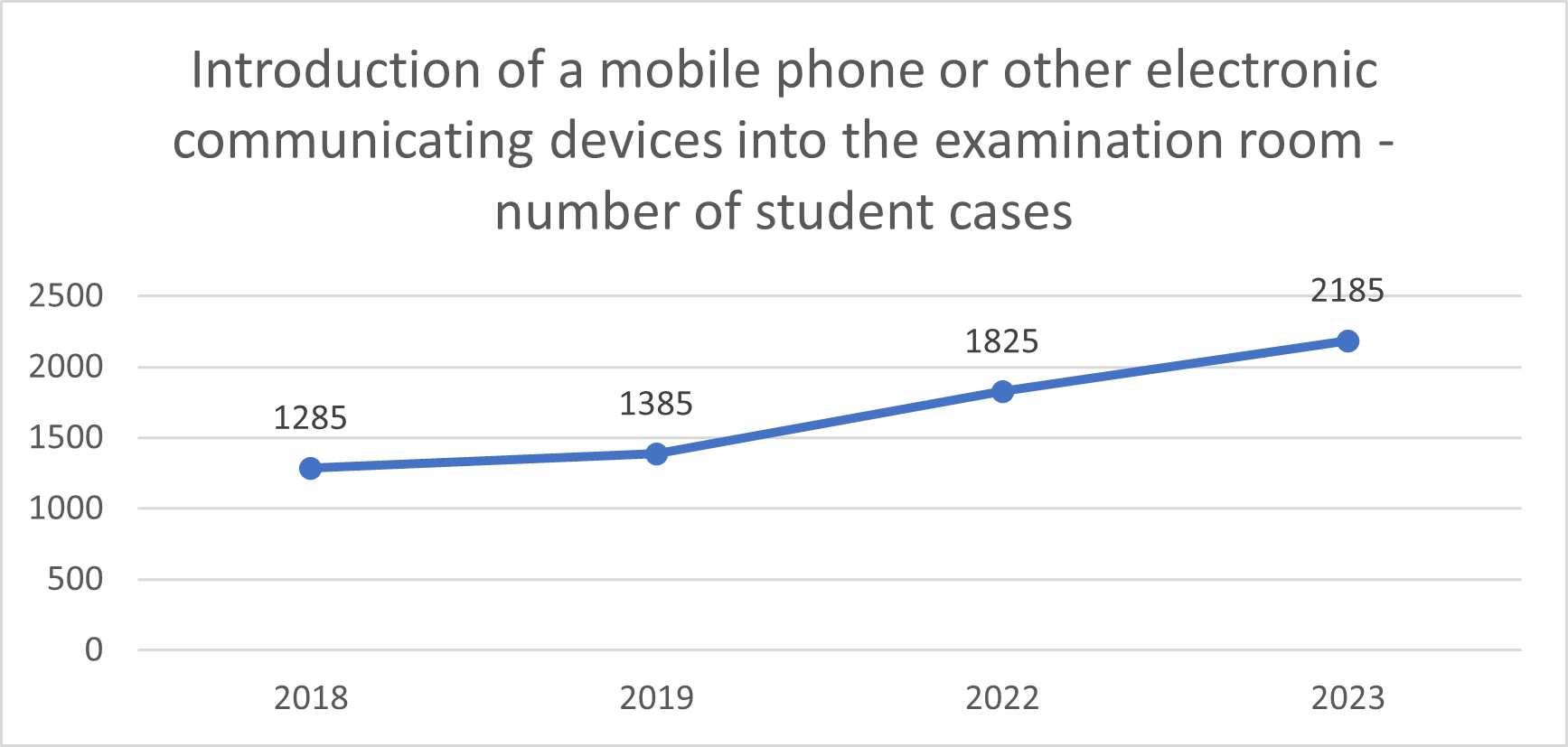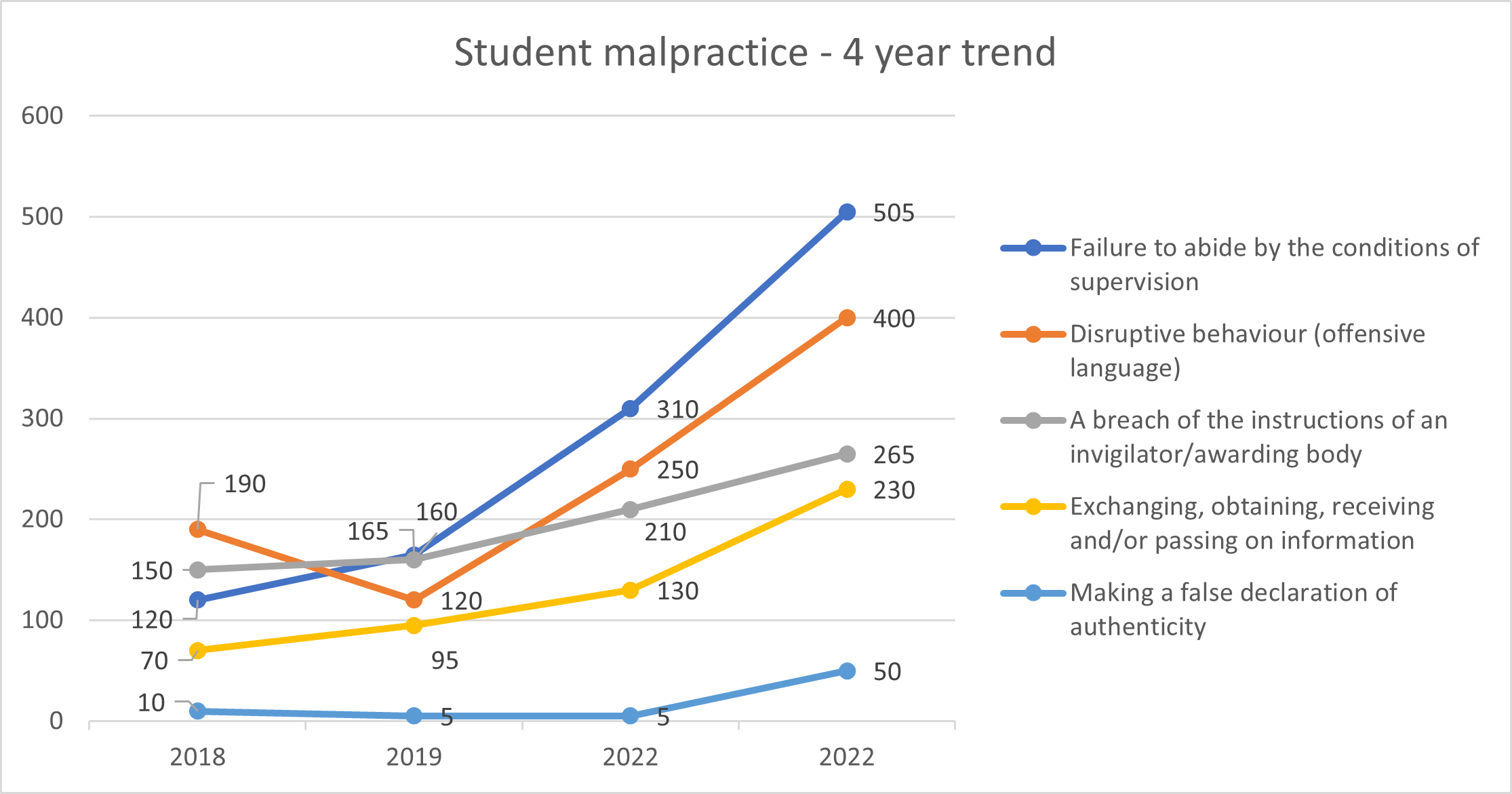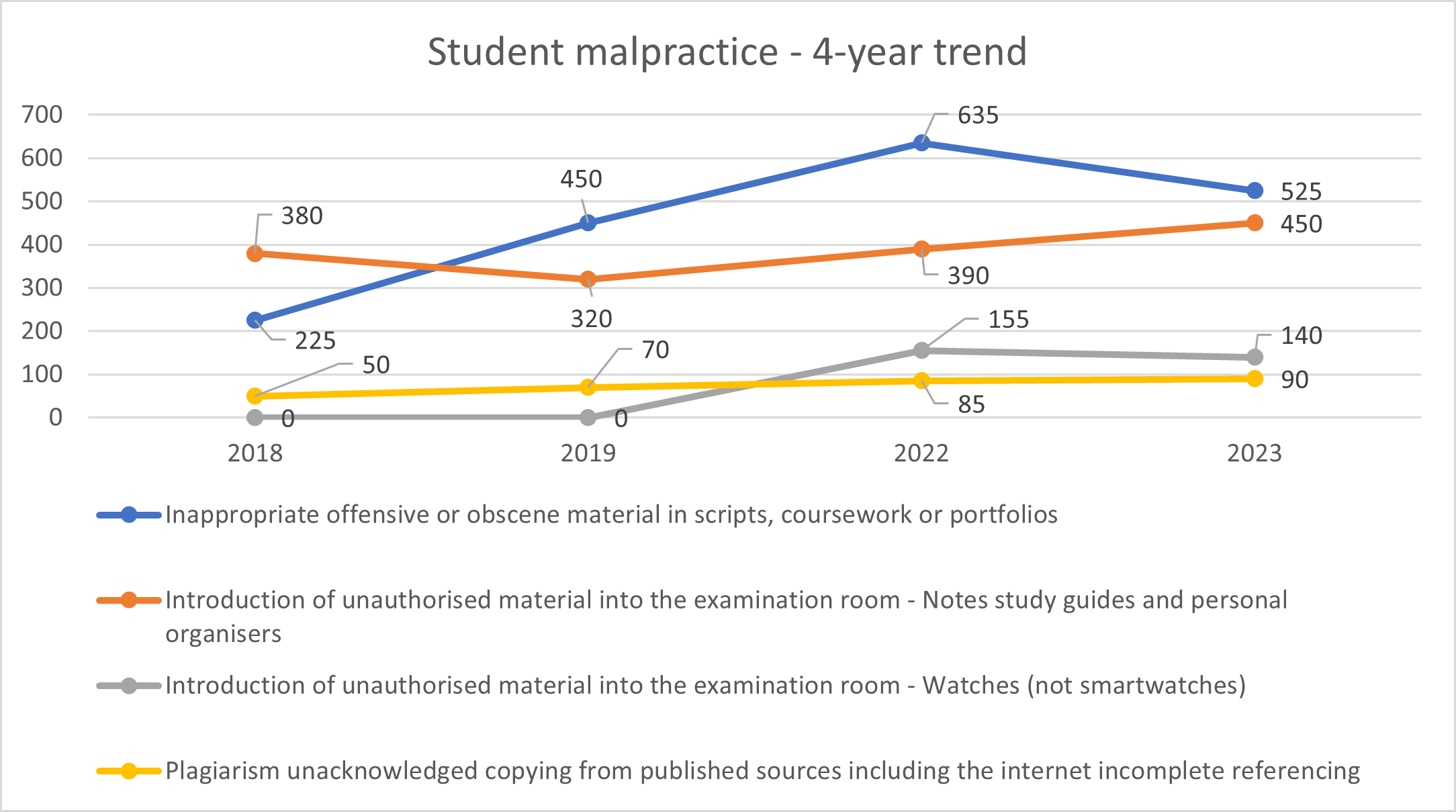08 Jan 2024
In this article, the NAEO analyses the data published by Ofqual in relation to malpractice during the summer 2023 exam series.
This analysis includes a summary of the key statistics, identifying trends from summer 2022 and those which have developed over recent years.
The conclusion of this article offers the NAEO’s opinion of these statistics and the impact they have on the examination system.
When analysing these statistics, there should be an awareness and understanding of the Joint Council for Qualifications’ (JCQ) Suspected Malpractice: Policies and Procedures guidance. This guidance is published/updated on an annual basis and defines candidate, school or college staff and centre malpractice. This guidance also details the policies and procedures agreed/required by the JCQ awarding bodies for dealing with breaches of security and malpractice investigations.
Key headlines
Please note that as an individual malpractice case may include multiple different types of offences the total number of cases (5,100) may exceed the total number of distinct malpractice cases (4,895)
Student malpractice
The total cases of student malpractice with penalties applied increased to 4,895 during the summer 2023 exam series, up from 4,105 cases in summer 2022.
Breakdown of malpractice cases:
The most common cases of malpractice (50 cases or more) were:
- Mobile phones and other communication devices (2180 cases). This accounts for 44.5% (this is the same percentage figure as summer 2022)
- The inclusion of inappropriate offensive or obscene material in scripts, coursework or portfolios (525 cases)
- Failing to abide by the conditions of supervision designated to maintain the security of the examinations (505 cases)
- Introduction of unauthorised material into the examination room - Notes study guides and personal organisers (450 cases)
- Disruptive behaviour in the examination room or assessment session including the use of offensive language (400 cases)
- A breach of instructions or advice of an invigilator supervisor or the awarding body in relation to the examination rules and regulations (265 cases)
- Exchanging, obtaining, receiving, and/or passing on information or the attempt to which could be examination related by means of – talking (230 cases)
- Introduction of unauthorised material into the examination room - Watches (not smartwatches) (140 cases)
- Plagiarism unacknowledged copying from published sources including the internet incomplete referencing (90 cases)
- Making a false declaration of authenticity (50 cases)
Less common instances of malpractice (less than 50 cases) where penalties were issued for exams sat during summer 2023 include:
- Introduction of unauthorised material into the examination room – Calculators, dictionaries when prohibited (35 cases or fewer)
- Allowing work to be copied e.g. posting written coursework on social networking sites prior to an examination/assessment (35 cases or fewer)
- Exchanging obtaining receiving passing on information or the attempt to which could be examination related by means of - electronic written or non-verbal communication (35 cases or fewer)
- Copying from another candidate including the misuse of ICT (25 cases or fewer)
- The deliberate destruction of work (25 cases or fewer)
- Behaving in a way as to undermine the integrity of the examination (20 cases or fewer)
- Misuse of or attempted misuse of examination material and resources (20 cases or fewer)
- Being in possession of confidential material in advance of the examination (15 cases or fewer)
- Bringing into the exam room notes in the wrong format or prohibited annotations (10 cases or fewer)
- Introduction of unauthorised material into the examination room - Personal stereo including MP3 iPod or any other similar electronic devices (10 cases or fewer)
- Collusion working collaboratively with other candidates beyond what is permitted (10 cases or fewer)
- Impersonation pretending to be someone else, arranging for another person to take ones place in an examination or an assessment (10 cases or fewer)
- Introduction of unauthorised material into the examination room - Own blank paper (5 cases or fewer)
- Allowing others to assist in the production of controlled assessments coursework or assisting others in the production of controlled assessments or coursework (no cases)
Staff malpractice
There were 220 cases of school/college staff malpractice where penalties were applied during the summer 2023 exam series, down from 240 cases in summer 2022.
Centre malpractice
There were 50 cases of centre malpractice where penalties were applied during the summer 2023 exam series, down from 55 cases in summer 2022.
Trends
Please note that there are no figures for summer 2020 and summer 2021 due to the cancellation of the relevant exam series.
The following trends from the summer 2022 and summer 2023 exam series, and across exam series since 2018 should be noted:
- The number of malpractice cases involving students has risen from the summer 2022 to summer 2023 exam series from 4,150 cases to 4,895 cases (18% increase)
- However, the number of entries also increased during this period:
- GCSE entries increased by over 100,000 from 14,252,045 (summer 2022) to 14,356,110 (summer 2023)
- AS and A level entries also increased by over 100,000 from 2,476,315 (summer 2022) to 2,576.505 (summer 2023)
- The introduction of a mobile phone or other electronic communicating devices into the examination room remains the most common form of candidate malpractice.

- There has been a percentage increase in the following cases of malpractice (figures shown as total cases, percentage of all malpractice cases during the summer 2023 series, and compared to all cases in summer 2022):
- Failing to abide by the conditions of supervision designated to maintain the security of the examinations (505 cases): 10.3% (up from 7.6% in summer 2022)
- Disruptive behaviour in the examination room or assessment session including the use of offensive language (400 cases): 8.2% (up from 6.1% in summer 2022)
- A breach of instructions or advice of an invigilator, supervisor or the awarding body in relation to the examination rules and regulations (265 cases): 5.4% (up from 5.1% in summer 2022)
- Exchanging, obtaining, receiving and/or passing on information or the attempt to which could be examination related by means of – talking (230 cases): 4.7% (up from 3.2% in summer 2022)
- Making a false declaration of authenticity (50 cases): 1% (up from fewer than 5 cases in summer 2022)

- There has been a percentage decrease in the following cases of malpractice (figures shown as total cases, percentage of all malpractice cases during the summer 2023 series, and compared to all cases in summer 2022):
- The inclusion of inappropriate offensive or obscene material in scripts, coursework or portfolios (525 cases): 10.7% (down from 15.5% in summer 2022)
- Introduction of unauthorised material into the examination room - Notes study guides and personal organisers (450 cases): 9.2% (down from 9.4% in summer 2022)
- Introduction of unauthorised material into the examination room - Watches (not smartwatches) (140 cases): 2.9% (down from 3.8% in summer 2022)
- Plagiarism unacknowledged copying from published sources including the internet incomplete referencing (90 cases): 1.9% (down from 2.1% in summer 2022)

Conclusion
Although there has been an increase in the number of proven cases of malpractice involving students during the summer 2023 exam series, this should be considered in the context of a range of factors, including:
- There has been an increase in the number of entries
- The impact of the pandemic and students being unfamiliar with formal examinations/regulations
- The impact/implementation of the recommendations from the Independent Commission on Malpractice
- The introduction of a exams-specific whistleblowing policy which requires exams officers/invigilators to report instances of malpractice and offers protection to those reporting cases of actual/suspected malpractice
- More robust JCQ regulations/requirements over the training of invigilators and an increased awareness of what constitutes malpractice and how it should be recorded/dealt with/reported
- The thorough nature of the online training and assessments, and face-to-face training, offered by The Exams Office which thoroughly test knowledge and understanding
- The large number of exams officers who have been trained by the JCQ, its awarding bodies and organisations such as The Exams Office with content which includes the exams officer’s responsibility of reporting instances of actual/suspected malpractice
Looking ahead to summer 2024, there should no surprise if there is a further increase in cases of student malpractice as JCQ continue to introduce/amend regulations which protect the integrity of the examination system and ensure the highest possible standards in the conducting of examinations. One such example is the amendment of section 19.2 of the Instructions for conducting examinations publication for the 2023/2024 academic year which states:
‘Candidates are under formal examination conditions from the moment they enter the room in which they will be taking their examination(s) until the point at which they are permitted to leave. Any malpractice suspected or actual, from this point must be reported to the relevant awarding body. Candidates must not talk to, attempt to communicate with or disturb other candidates once they have entered the examination room.’
It could also be noted that the instances/cases of malpractice are very small when one considers the number of candidates who sat examinations during summer 2023.
The NAEO recognises that if our examination system is to retain its position as a world-leading system, then all instances of malpractice – centre, staff and student malpractice - should be reported and dealt with appropriately. By being aware of the situation, JCQ and its awarding bodies are able to deal with issues so that the highest possible standards are maintained in the management, administration and conducting of examinations and assessments.
The NAEO welcomes the work of JCQ, its awarding bodies and the Independent Commission on Malpractice in clarifying the definition of malpractice/maladministration and encouraging centres and centre staff to report instances of actual and/or suspected malpractice. If this has resulted in an increase in the reported cases of malpractice, it reveals that we are succeeding in creating a robust examination system which has the confidence of key stakeholders including employers, higher and further educational establishments, schools and colleges, senior leaders, teachers, students and their parents/carers.
Reference